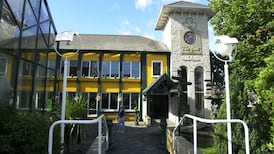Kingspan chief executive Gene Murtagh has secured “qualified” support from a big shareholder advisory firm for his re-election to the group’s board next month, given the reputational damage the insulation group suffered from an inquiry into the Grenfell Tower disaster.
Institutional Shareholder Services (ISS) said its backing, in advance of Kingspan’s annual general meeting (agm) on May 1st, reflects a recognition “that substantive remedial changes have been made, and new checks and balances introduced, over the course of several years”.
Mr Murtagh has, since 2005, been Kingspan chief executive, which was founded by his father, Eugene.
ISS has also given qualified support, meaning it is not without some degree of reservation, for planned maximum executive bonus opportunity increases.
Are you getting the best deal when returning your plastic drinks bottles and cans for a refund?
How three Irish companies are adapting to Trump’s tariffs
ECB interest rate cut: What does it mean for mortgage borrowers on trackers, fixed and variable rates?
Failure to connect electricity systems on island of Ireland has led to higher prices and greater emissions
The final report of a British government inquiry into the 2017 Grenfell fire in London, which killed 72 people, concluded last September that was it was the result of “decades of failure” by central and local government, regulators and the city’s fire brigade as well as “systemic dishonesty” of companies – including Kingspan – whose products were used on the facade of the tower during a refurbishment completed a year before the disaster.
“A vote for the re-election of Gene Murtagh, the CEO [chief executive], is considered warranted, although again this is not without concern,” said ISS in an advisory report for big shareholders in advance of the agm. The qualified backing is in line with ISS’s recommendations in advance of each of the last two meetings, but the first since the final report on the disaster was published.

“One in five US households consume Kerrygold” – Ornua chief executive Conor Galvin
“The qualified nature of the support reflects concern at the information that has come to light at the Grenfell inquiry and recognises that although the company was not found to be causative of the tragedy, there has been reputational damage,” said ISS.
Kingspan’s Kooltherm K15 insulation board was used for 5 per cent of the insulation layer inserted behind the new cladding, unknown to it, after there were supply issues with the main provider, UK-based Celotex.
However, inquiry chairman Martin Moore-Bick said Kingspan “knowingly created a false market” for the insulation used on the facade by falsely claiming it successfully passed tests to allow it to be used on high-rise buildings more than 18m in height.
The inquiry found that both companies’ insulation products were not the main cause of the rate and extent of the fire. Instead, that lay with the plastic-cored aluminium composite material cladding panels – made by a unit of US metals giant Arconic – used for the outer layer of the facade of the 62m tower.
Kingspan previously said it had addressed issues that arose during the inquiry, including the implementation of extensive and externally verified measures to ensure its conduct and compliance standards are “world-leading”.
The British government said in February it will investigate units of Arconic, Kingspan, Saint-Gobain, which owned Celotex at the time of the fire, and others, which could see them being banned from future public work in that market.
ISS signalled in its report that it also has reservations about Kingspan’s new remuneration policy, which will mean future executive salaries increase by 9 per cent and maximum bonuses rise to 200 per cent of base pay from 150 per cent.
The policy also raises maximum annual long-term incentive plan awards to the chief executive to 450 per cent of salary from 300 per cent.
Still, ISS said qualified support was warranted given the company’s growth since executive incentives were last subject to material changes in six years. Revenue, earnings per share, employee numbers and scale have grown significantly since then.
“The company has provided a compelling and thorough rationale, citing growth since the last policy was introduced, especially in the US market,” it said. “The increased quantum also remains below the median compared to its global peers, with maximum levels in line with UK norms.”














